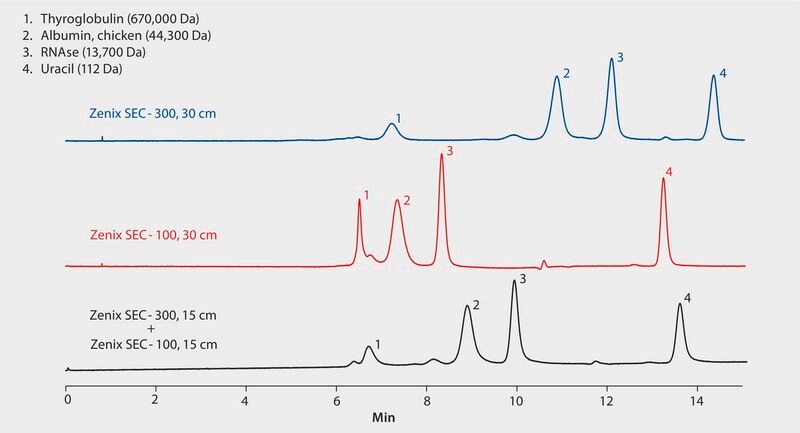HPLC Analysis of Protein Standards by Size Exclusion on Zenix® as Affected by Pore Size: 100Å vs. 300Å

Materials
analytical column
Zenix® SEC-100 Gel Filtration Column, 3μm
L × I.D. 30 cm × 4.6 mm, 3 μm particle size, stainless steelZenix® SEC-300 Gel Filtration Column, 3 μm
L × I.D. 15 cm × 4.6 mm, 3 μm particle size, stainless steelZenix® SEC-300 Gel Filtration Column, 3 μm
L × I.D. 30 cm × 4.6 mm, 3 μm particle size, stainless steelstandard
CONDITIONS
column
Zenix SEC-300, 30 cm x 4.6 mm I.D., 3 μm particles (Z777028)
column
Zenix SEC-100, 30 cm x 4.6 mm I.D., 3 μm particles (Z777006)
column
Zenix SEC-300, 15 cm x 4.6 mm I.D., 3 μm particles (Z777026)
column
Zenix SEC-100, 15 cm x 4.6 mm I.D., 3 μm particles
mobile phase
0.15 M sodium phosphate, monobasic, pH 7.0 with sodium hydroxide
flow rate
0.3 mL/min
pressure
1215 psi (84 bar)
column temp.
25 °C
detector
UV, 215 nm
injection
0.5 μL
sample
Waters BEH125 SEC protein standard
Description
Analysis Note
With size exclusion chromatography, pore size fundamentally determines the relative retention of analytes. Larger pores permit inclusion of larger analytes, smaller pores exlcude larger analytes. This application compares the retention and selectivity of protein standards on columns of widely differing pore sizes as well as the sequential combination of both. The combination of the two in series provides an intermediate selectivity. Each 30 cm column was compared to combination of the two 15 cm columns connected in series; in the case of the latter, the SEC-300 preceding the SEC-100 column in the flow path.
Legal Information
Zenix is a registered trademark of Sepax Technologies